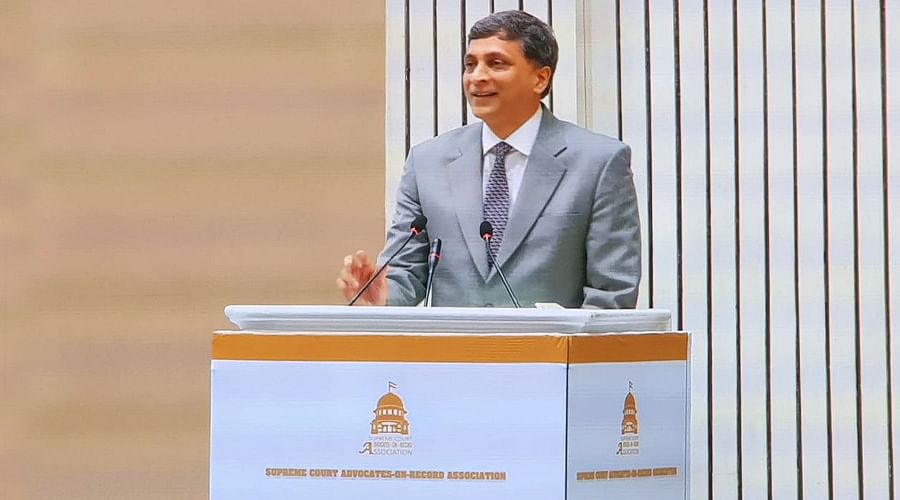
TATA v MISTRY [Day 6]
Hearing to resume before Supreme Court in a short while from now.
@tatatrusts
@TataCompanies
#SupremeCourt
Hearing to resume before Supreme Court in a short while from now.
@tatatrusts
@TataCompanies
#SupremeCourt

TATA v MISTRY
Senior counsel Shyam Divan begins arguments on behalf of Shapoorji Pallonji group.
@tatatrusts @TataCompanies
Senior counsel Shyam Divan begins arguments on behalf of Shapoorji Pallonji group.
@tatatrusts @TataCompanies

TATA v MISTRY
This case is about corporate governance. We have moved from corporate democracy to a much richer corporate governance under the amended Companies Act: Divan
@tatatrusts
This case is about corporate governance. We have moved from corporate democracy to a much richer corporate governance under the amended Companies Act: Divan
@tatatrusts
TATA v MISTRY
The management of company is the board. The most crucial obligation imposed on Director now is that the director is a fiduciary. A fiduciary's allegiance is to the company alone: Divan
#SupremeCourt #tatasons
The management of company is the board. The most crucial obligation imposed on Director now is that the director is a fiduciary. A fiduciary's allegiance is to the company alone: Divan
#SupremeCourt #tatasons
TATA v MISTRY
Lack of probity is much broader than financial irregularities.
The long relationship between the two groups developed over decades. It developed in the context of a statutory framework which restricted the role of private trust: Divan.
Lack of probity is much broader than financial irregularities.
The long relationship between the two groups developed over decades. It developed in the context of a statutory framework which restricted the role of private trust: Divan.
TATA v MISTRY
There was a beach of articles in the removal of Cyrus Mistry: Divan
#tatasons #tatamistry
There was a beach of articles in the removal of Cyrus Mistry: Divan
#tatasons #tatamistry
TATA v MISTRY
Management has to be by the board as per the articles and the statute.
Termination of managing director has to be by a resolution. The same process as is followed for appointment has to be followed: Divan
Management has to be by the board as per the articles and the statute.
Termination of managing director has to be by a resolution. The same process as is followed for appointment has to be followed: Divan
TATA v MISTRY
Section 166 is very very important. It lays down duties of Directors.
If you are torn between allegiance to company and allegiance to something else, then you cannot act as a Director: Divan.
Section 166 is very very important. It lays down duties of Directors.
If you are torn between allegiance to company and allegiance to something else, then you cannot act as a Director: Divan.
TATA v MISTRY
Director cannot abdicate or yield on his/her independent judgment. Director may consult or take advice but has to act independently and cannot be compelled or coerced: Divan
Director cannot abdicate or yield on his/her independent judgment. Director may consult or take advice but has to act independently and cannot be compelled or coerced: Divan
TATA v MISTRY
Two directors had praised Mistry for his performance as Executive Chairperson four months before his removal. Those two directors did not even file their response explaining their conduct: Divan.
#tatavmisrty #tata #mistry
Two directors had praised Mistry for his performance as Executive Chairperson four months before his removal. Those two directors did not even file their response explaining their conduct: Divan.
#tatavmisrty #tata #mistry
TATA v MISTRY
Supreme Court says it is intending to make certain observations on the procedure to be followed by tribunals. This was in the context of whether plea before NCLAT should have been amended by way of amendment applications or additional affidavits.
@tatatrusts
Supreme Court says it is intending to make certain observations on the procedure to be followed by tribunals. This was in the context of whether plea before NCLAT should have been amended by way of amendment applications or additional affidavits.
@tatatrusts
TATA v MISTRY
The selection of Tata Sons chairperson is crucial. It affects so many companies and stakeholders across countries and continents: Divan
#SupremeCourt #tatasons #mistry
The selection of Tata Sons chairperson is crucial. It affects so many companies and stakeholders across countries and continents: Divan
#SupremeCourt #tatasons #mistry
TATA v MISTRY
Ratan Tata is not subject to the discipline under Section 166 of the Companies Act. He ceased of be board member in December 2012 and did not attended a single board meeting till October 2016: Divan
Ratan Tata is not subject to the discipline under Section 166 of the Companies Act. He ceased of be board member in December 2012 and did not attended a single board meeting till October 2016: Divan
TATA v MISTRY
Shyam Divan reading case laws on corporate governance and fiduciary duties of Director stating how the Companies Act moved from corporate majority to corporate governance.
Shyam Divan reading case laws on corporate governance and fiduciary duties of Director stating how the Companies Act moved from corporate majority to corporate governance.
TATA v MISTRY
Divan says TATA Trusts could not vote on its own shares between 1964 and 2000 due to statutory restrictions and it was a public trustee appointed by Central government who could vote on your shares: Divan
Divan says TATA Trusts could not vote on its own shares between 1964 and 2000 due to statutory restrictions and it was a public trustee appointed by Central government who could vote on your shares: Divan
TATA v MISTRY
That was when Shapoorji Pallonji because of their relationship with Tata became a reliable partner who could vote and that is why Tata sold their shares to SPG. This continued till public trustee mandate was done away with in 2000 and Tata Trusts could vote : Divan
That was when Shapoorji Pallonji because of their relationship with Tata became a reliable partner who could vote and that is why Tata sold their shares to SPG. This continued till public trustee mandate was done away with in 2000 and Tata Trusts could vote : Divan
TATA v MISTRY
Divan giving history of Shapoorji Pallonji group's relationship with TATA group and how various SP group persons served on board of various Tata group companies.
The relationship is 5 decades old of which 4 was during public trustee regime: Divan
@TataCompanies
Divan giving history of Shapoorji Pallonji group's relationship with TATA group and how various SP group persons served on board of various Tata group companies.
The relationship is 5 decades old of which 4 was during public trustee regime: Divan
@TataCompanies
TATA v MISTRY
The relationship was of one utmost trust and good faith. The only thing we asked for was a place on the board which is recognised under Companies Act of 2013: Divan
The relationship was of one utmost trust and good faith. The only thing we asked for was a place on the board which is recognised under Companies Act of 2013: Divan
TATA v MISTRY
Hence, the removal of Mistry was illegal, oppressive and against good faith and trust which Tata and Shapoorji Pallonji group shared: Divan
@tatatrusts
@TataCompanies
#SupremeCourt #tatasons
Hence, the removal of Mistry was illegal, oppressive and against good faith and trust which Tata and Shapoorji Pallonji group shared: Divan
@tatatrusts
@TataCompanies
#SupremeCourt #tatasons
TATA v MISTRY
Bench rises for the day. Hearing to continue tomorrow.
#SupremeCourt #tatasons
@tatatrusts @TataCompanies @RNTata2000
Bench rises for the day. Hearing to continue tomorrow.
#SupremeCourt #tatasons
@tatatrusts @TataCompanies @RNTata2000
• • •
Missing some Tweet in this thread? You can try to
force a refresh








